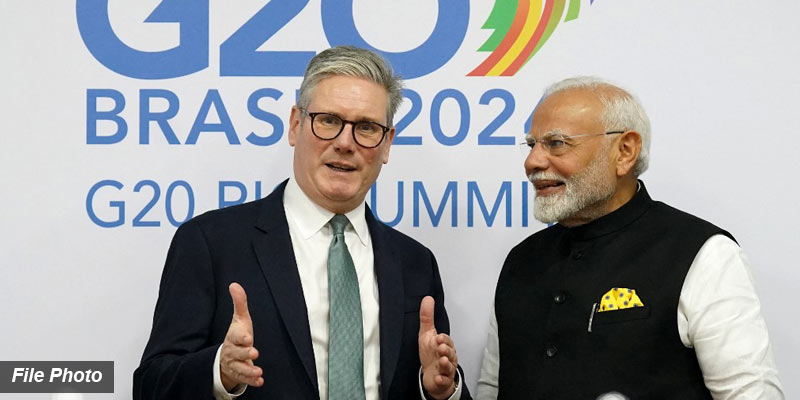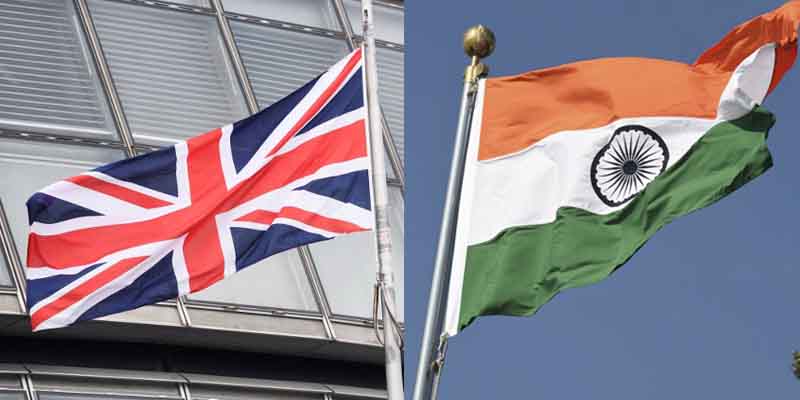- India
- May 07
India, UK conclude Free Trade Agreement
• India and the United Kingdom sealed a landmark Free Trade Agreement (FTA) that will lower tariffs on 99 per cent Indian exports.
• The agreement will make it easier for British firms to export whisky, cars and other products to India besides boosting overall trade basket.
• Along with the FTA, the two sides also sealed a Double Contributions Convention (DCC).
• The engagement builds upon the discussions held between the two Prime Ministers on the sidelines of the G20 Summit in Rio de Janeiro, Brazil in November 2024.
• Following the meeting between the two Prime Ministers, intense FTA negotiations resumed in February 2025 marked by several engagements between the Commerce and Industry Minister Piyush Goyal and UK Secretary of State Jonathan Reynolds and their teams.
• The FTA takes place in the backdrop of growing economic relations between India and the UK as exemplified in the bilateral trade of about $60 billion which is projected to double by 2030.
• The FTA will benefit 99 per cent Indian exports from zero duty and ease mobility for professionals including business visitors and investors.
Highlights of the FTA:
• PM Modi described the two pacts as a historic milestone to catalyse trade, investment, growth and job creation in both the economies and further deepen the India-UK Comprehensive Strategic Partnership.
• Both leaders agreed that the landmark agreements between the two big and open market economies of the world will open new opportunities for businesses, strengthen economic linkages, and deepen people-to-people ties.
• PM Starmer said that strengthening alliances and reducing trade barriers with economies around the world is part of their government’s ‘Plan for Change’ to deliver a stronger and more secure economy.
• The two leaders agreed that expanding economic and commercial ties between India and the UK remain a cornerstone of the increasingly robust and multifaceted partnership.
• The conclusion of a balanced, equitable and ambitious FTA, covering trade in goods and services, is expected to significantly enhance bilateral trade, generate new avenues for employment, raise living standards, and improve the overall well-being of citizens in both countries.
• It will also unlock new potential for the two nations to jointly develop products and services for global markets.
• This agreement cements the strong foundations of the India-UK Comprehensive Strategic Partnership, and paves the way for a new era of collaboration and prosperity.
• It will ensure comprehensive market access for Indian goods across all sectors and India will gain from tariff elimination on about 99 per cent of tariff lines (product categories) covering almost 100 per cent of the trade values.
• Whisky and gin tariffs will be halved from 150 per cent to 75 per cent before reducing to 40 per cent by the 10th year of the deal, while automotive tariffs will go from over 100 per cent to 10 per cent under a quota.
• Other goods with reduced tariffs, which can open markets and make trade cheaper for businesses and Indian consumers, include cosmetics, aerospace, lamb, medical devices, salmon, electrical machinery, soft drinks, chocolate, and biscuits.
• The FTA provides a positive impact on India’s manufacturing across labour and technology intensive sectors and opens up export opportunities for sectors such as textiles, marine products, leather, footwear, sports goods and toys, gems and jewellery, engineering goods, auto parts and engines and organic chemicals.
• The trade deal will also ease mobility for professionals including contractual service suppliers, business visitors, investors, intra-corporate transferees, partners and dependent children of intra-corporate transferees with right to work.
• It will facilitate mobility of independent professionals like yoga instructors, musicians and chefs.
What happens next?
• India and the UK will work together to finalise the legal text of the Free Trade Agreement and produce a usable and legally binding treaty. Both sides will sign the completed treaty text.
• Entry into force will take place once both the UK and India have completed their ratification processes.
• Once the deal has taken effect, businesses, and citizens from across the UK will be able to capitalise on the benefits of the agreement.
Manorama Yearbook app is now available on Google Play Store and iOS App Store


